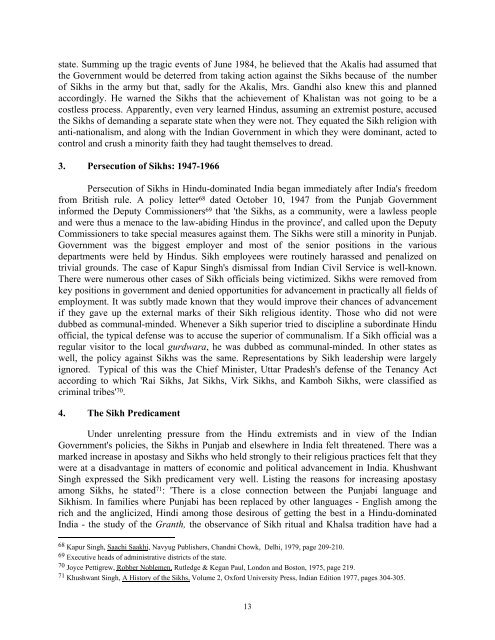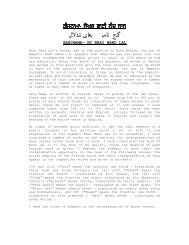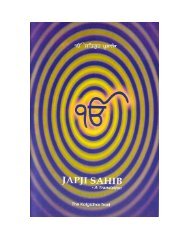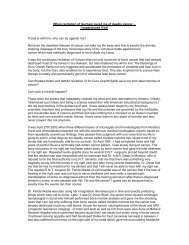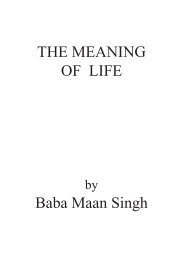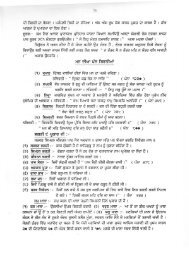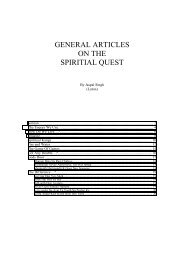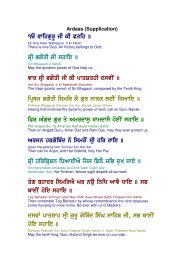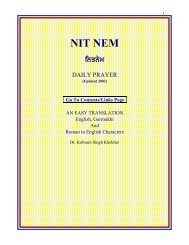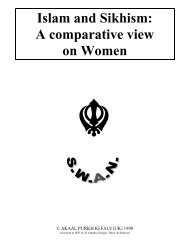Sant Jarnail Singh Bhindranwale - Sikh Missionary Society (UK)
Sant Jarnail Singh Bhindranwale - Sikh Missionary Society (UK)
Sant Jarnail Singh Bhindranwale - Sikh Missionary Society (UK)
Create successful ePaper yourself
Turn your PDF publications into a flip-book with our unique Google optimized e-Paper software.
state. Summing up the tragic events of June 1984, he believed that the Akalis had assumed thatthe Government would be deterred from taking action against the <strong>Sikh</strong>s because of the numberof <strong>Sikh</strong>s in the army but that, sadly for the Akalis, Mrs. Gandhi also knew this and plannedaccordingly. He warned the <strong>Sikh</strong>s that the achievement of Khalistan was not going to be acostless process. Apparently, even very learned Hindus, assuming an extremist posture, accusedthe <strong>Sikh</strong>s of demanding a separate state when they were not. They equated the <strong>Sikh</strong> religion withanti-nationalism, and along with the Indian Government in which they were dominant, acted tocontrol and crush a minority faith they had taught themselves to dread.3. Persecution of <strong>Sikh</strong>s: 1947-1966Persecution of <strong>Sikh</strong>s in Hindu-dominated India began immediately after India's freedomfrom British rule. A policy letter 68 dated October 10, 1947 from the Punjab Governmentinformed the Deputy Commissioners 69 that 'the <strong>Sikh</strong>s, as a community, were a lawless peopleand were thus a menace to the law-abiding Hindus in the province', and called upon the DeputyCommissioners to take special measures against them. The <strong>Sikh</strong>s were still a minority in Punjab.Government was the biggest employer and most of the senior positions in the variousdepartments were held by Hindus. <strong>Sikh</strong> employees were routinely harassed and penalized ontrivial grounds. The case of Kapur <strong>Singh</strong>'s dismissal from Indian Civil Service is well-known.There were numerous other cases of <strong>Sikh</strong> officials being victimized. <strong>Sikh</strong>s were removed fromkey positions in government and denied opportunities for advancement in practically all fields ofemployment. It was subtly made known that they would improve their chances of advancementif they gave up the external marks of their <strong>Sikh</strong> religious identity. Those who did not weredubbed as communal-minded. Whenever a <strong>Sikh</strong> superior tried to discipline a subordinate Hinduofficial, the typical defense was to accuse the superior of communalism. If a <strong>Sikh</strong> official was aregular visitor to the local gurdwara, he was dubbed as communal-minded. In other states aswell, the policy against <strong>Sikh</strong>s was the same. Representations by <strong>Sikh</strong> leadership were largelyignored. Typical of this was the Chief Minister, Uttar Pradesh's defense of the Tenancy Actaccording to which 'Rai <strong>Sikh</strong>s, Jat <strong>Sikh</strong>s, Virk <strong>Sikh</strong>s, and Kamboh <strong>Sikh</strong>s, were classified ascriminal tribes' 70 .4. The <strong>Sikh</strong> PredicamentUnder unrelenting pressure from the Hindu extremists and in view of the IndianGovernment's policies, the <strong>Sikh</strong>s in Punjab and elsewhere in India felt threatened. There was amarked increase in apostasy and <strong>Sikh</strong>s who held strongly to their religious practices felt that theywere at a disadvantage in matters of economic and political advancement in India. Khushwant<strong>Singh</strong> expressed the <strong>Sikh</strong> predicament very well. Listing the reasons for increasing apostasyamong <strong>Sikh</strong>s, he stated 71 : 'There is a close connection between the Punjabi language and<strong>Sikh</strong>ism. In families where Punjabi has been replaced by other languages - English among therich and the anglicized, Hindi among those desirous of getting the best in a Hindu-dominatedIndia - the study of the Granth, the observance of <strong>Sikh</strong> ritual and Khalsa tradition have had a68 Kapur <strong>Singh</strong>, Saachi Saakhi, Navyug Publishers, Chandni Chowk, Delhi, 1979, page 209-210.69 Executive heads of administrative districts of the state.70 Joyce Pettigrew, Robber Noblemen, Rutledge & Kegan Paul, London and Boston, 1975, page 219.71 Khushwant <strong>Singh</strong>, A History of the <strong>Sikh</strong>s, Volume 2, Oxford University Press, Indian Edition 1977, pages 304-305.13


